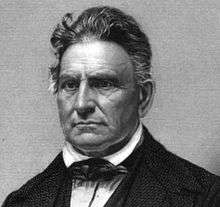Joseph M. Harper
Joseph Merrill Harper (June 21, 1787 – January 15, 1865) was an American physician, banker and Jacksonian politician in the U.S. state of New Hampshire. He served as a member of the United States House of Representatives, the New Hampshire State Senate and the New Hampshire House of Representatives and was Acting Governor of New Hampshire.
Joseph Merrill Harper | |
|---|---|
 | |
| Member of the New Hampshire House of Representatives | |
| In office 1826–1827 | |
| Member of the New Hampshire State Senate | |
| In office 1829–1830 | |
| President of the New Hampshire Senate | |
| In office 1830–1831 | |
| Preceded by | Samuel Cartland |
| Succeeded by | Samuel Cartland |
| Governor of New Hampshire Acting | |
| In office February 28, 1831 – June 2, 1831 | |
| Preceded by | Matthew Harvey |
| Succeeded by | Samuel Dinsmoor |
| Member of the United States House of Representatives from New Hampshire's At large district | |
| In office March 4, 1831 – March 4, 1835 | |
| Preceded by | Jonathan Harvey |
| Succeeded by | Samuel Cushman |
| Personal details | |
| Born | June 21, 1787 Limerick, Massachusetts, U.S. (now Limerick, Maine) |
| Died | January 15, 1865 (aged 77) Canterbury, New Hampshire, U.S. |
| Resting place | Village Cemetery |
| Political party | Jacksonian |
| Spouse(s) | Elizabeth Clough |
| Profession | Physician Banker Politician |
| Military service | |
| Branch/service | United States Army, 4th Infantry |
| Rank | Assistant Surgeon |
| Battles/wars | War of 1812 |
Early life and career
Harper was born in Limerick (in modern-day Maine, then a part of Massachusetts) and attended Fryeburg Academy.[1] He studied medicine and began the practice of medicine in Sanbornton, New Hampshire in 1810.[2] In 1811, he moved to Canterbury, New Hampshire to continue his practice. He served as assistant surgeon in the 4th Infantry in the War of 1812.[3] After the war he returned to his medical practice, and was elected a Fellow of the New Hampshire Medical Society in 1821.[4]
Political career
He was a member of the New Hampshire House of Representatives in 1826 and 1827, and justice of the peace in Canterbury from 1826–1865.[5] Harper served in the New Hampshire State Senate in 1829 and 1830, and was president of the State Senate in 1831. He became Acting Governor of New Hampshire in February 1831 when Governor Matthew Harvey resigned as governor in order to accept a position as a United States federal judge. Harper served as Acting Governor from February 1831 – June 1831.[6]
Harper was elected as a Jacksonian candidate to the Twenty Second and Twenty Third Congresses, serving as a U.S. Representative from March 4, 1831 – March 3, 1835.[7]
After leaving Congress, he resumed the practice of medicine. He was justice of the peace from 1835–1865 and president of the Mechanics Bank of Concord from 1847–1856.[8]
Harper died on January 15, 1865 in Canterbury,[9] and is interred in the Village Cemetery.
Personal life
Harper married Elizabeth Clough on June 6, 1816. They had two sons and a daughter.[10]
References
- Lanman, Charles (1866). Dictionary of the United States Congress. Scholarly Publishing Office, University of Michigan Library. p. 168.
- Monthly Biographical Magazine, Volume 1, Issue 1. 1852. p. 57.
- Wilson, James Grant and Fiske, John (1888). Appletons' Cyclopaedia of American Biography, Volume 3. D. Appleton. p. 88.
- New-Hampshire Medical Society (1911). Records of the New Hampshire medical society from its organization in 1791 to the year 1854. Rumford printing co. p. 161.
- Livingston, John (1853). Biographical sketches of distinguished Americans now living. Published at 157 Broadway. p. 58.
- "Publications – Portraits of Legislators On State House Third Floor". New Hampshire Division of Historical Resources. Archived from the original on December 13, 2012. Retrieved December 12, 2013.CS1 maint: BOT: original-url status unknown (link)
- Lanman, Charles and Morrison, Joseph M. (1887). Biographical Annals of the Civil Government of the United States. J.M. Morrison. p. 218.
- Wilson, James Grant and Fiske, John (1888). Appletons' Cyclopaedia of American Biography, Volume 3. D. Appleton. p. 88.
- "Publications – Portraits of Legislators On State House Third Floor". New Hampshire Division of Historical Resources. Retrieved December 12, 2013.
- Livingston, John (1853). Biographical sketches of distinguished Americans now living. Published at 157 Broadway. p. 58.
External links
- United States Congress. "Joseph M. Harper (id: H000224)". Biographical Directory of the United States Congress.
- Joseph M. Harper at Find a Grave
- National Governors Association profile
| Political offices | ||
|---|---|---|
| Preceded by Matthew Harvey |
Acting Governor of New Hampshire February 28, 1831 – June 1831 |
Succeeded by Samuel Dinsmoor |
| Preceded by Samuel Cartland |
President of the New Hampshire Senate 1830– 1831 |
Succeeded by Samuel Cartland |
| U.S. House of Representatives | ||
| Preceded by Jonathan Harvey |
Member of the U.S. House of Representatives from New Hampshire's At-large congressional district 1831–1835 |
Succeeded by Samuel Cushman |
